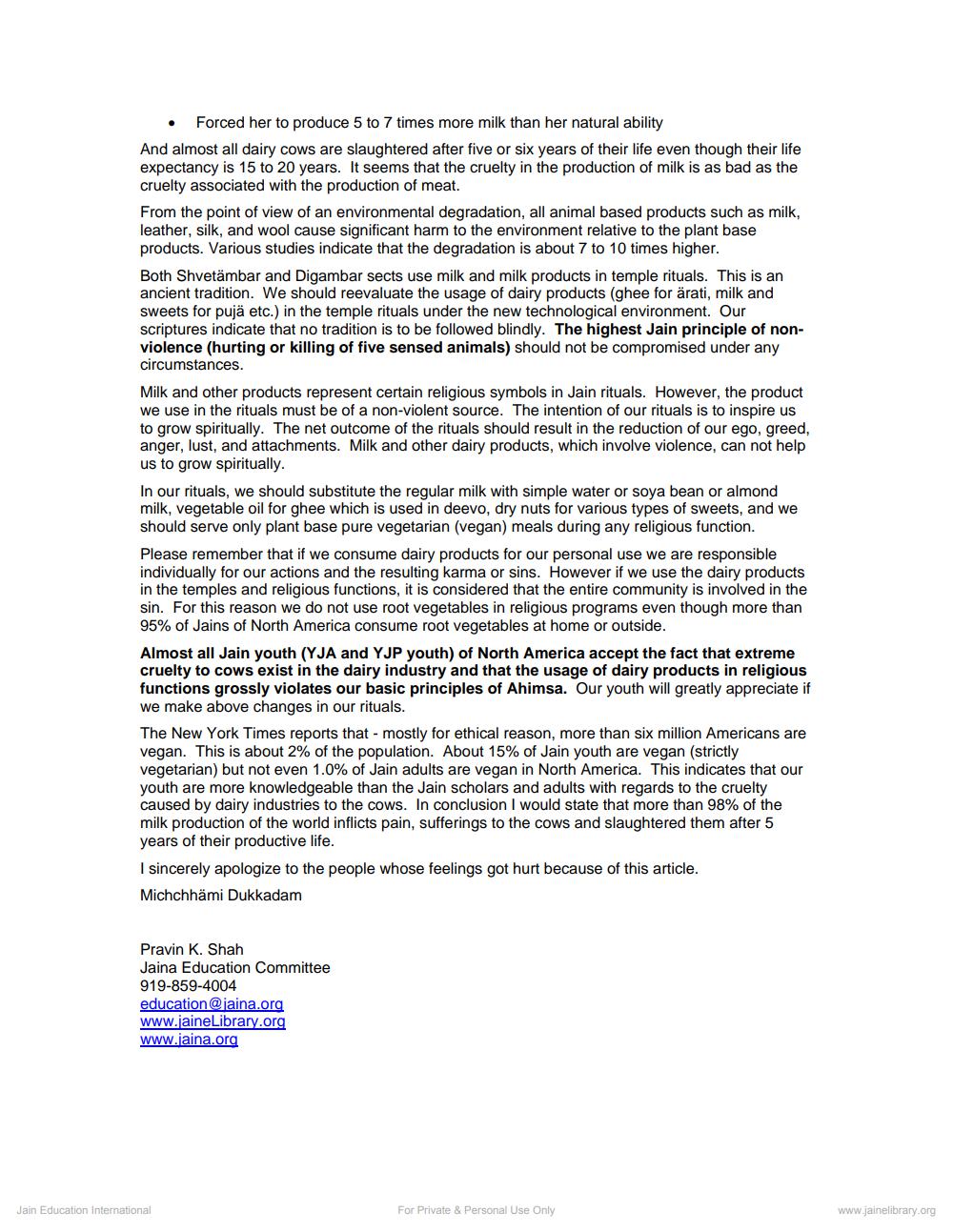Book Title: Jain Way of Life and Ethical Living and Environment Author(s): Pravin K Shah Publisher: JAINA Education Committee View full book textPage 4
________________ * Forced her to produce 5 to 7 times more milk than her natural ability And almost all dairy cows are slaughtered after five or six years of their life even though their life expectancy is 15 to 20 years. It seems that the cruelty in the production of milk is as bad as the cruelty associated with the production of meat. From the point of view of an environmental degradation, all animal based products such as milk, leather, silk, and wool cause significant harm to the environment relative to the plant base products. Various studies indicate that the degradation is about 7 to 10 times higher. Both Shvetambar and Digambar sects use milk and milk products in temple rituals. This is an ancient tradition. We should reevaluate the usage of dairy products (ghee for arati, milk and sweets for puja etc.) in the temple rituals under the new technological environment. Our scriptures indicate that no tradition is to be followed blindly. The highest Jain principle of nonviolence (hurting or killing of five sensed animals) should not be compromised under any circumstances. Milk and other products represent certain religious symbols in Jain rituals. However, the product we use in the rituals must be of a non-violent source. The intention of our rituals is to inspire us to grow spiritually. The net outcome of the rituals should result in the reduction of our ego, greed, anger, lust, and attachments. Milk and other dairy products, which involve violence, can not help us to grow spiritually. In our rituals, we should substitute the regular milk with simple water or soya bean or almond milk, vegetable oil for ghee which is used in deevo, dry nuts for various types of sweets, and we should serve only plant base pure vegetarian (vegan) meals during any religious function. Please remember that if we consume dairy products for our personal use we are responsible individually for our actions and the resulting karma or sins. However if we use the dairy products in the temples and religious functions, it is considered that the entire community is involved in the sin. For this reason we do not use root vegetables in religious programs even though more than 95% of Jains of North America consume root vegetables at home or outside. Almost all Jain youth (YJA and YJP youth) of North America accept the fact that extreme cruelty to cows exist in the dairy industry and that the usage of dairy products in religious functions grossly violates our basic principles of Ahimsa. Our youth will greatly appreciate if we make above changes in our rituals. The New York Times reports that - mostly for ethical reason, more than six million Americans are vegan. This is about 2% of the population. About 15% of Jain youth are vegan (strictly vegetarian) but not even 1.0% of Jain adults are vegan in North America. This indicates that our youth are more knowledgeable than the Jain scholars and adults with regards to the cruelty caused by dairy industries to the cows. In conclusion I would state that more than 98% of the milk production of the world inflicts pain, sufferings to the cows and slaughtered them after 5 years of their productive life. I sincerely apologize to the people whose feelings got hurt because of this article. Michchhami Dukkadam Pravin K. Shah Jaina Education Committee 919-859-4004 [email protected] www.jaine Library.org www.jaina.org Jain Education International For Private & Personal Use Only www.jainelibrary.orgPage Navigation
1 2 3 4
